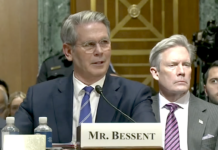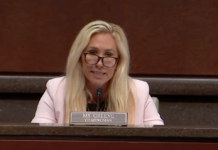
A proposal that would bring new scrutiny to special-interest tax breaks that cost the state treasury billions of dollars every year has cleared the state Senate.
The measure, sponsored by Sen. John Albers, would allow the chairs of the Senate Finance and House Ways and Means committee to each request an economic analysis of up to five tax credits every year. The bill easily cleared the chamber Monday with a unanimous vote and now heads to the House.
“We want to keep Georgia the No. 1 place to do business, and as former President Ronald Reagan said it best, ‘The greatest social program ever created was a job,’” the Roswell Republican said. “And we can continue to solve so many challenges with a balanced and proactive approach. That means sound fiscal responsibility and keeping people working.”
Lawmakers have created dozens of tax breaks over time, including one credited with attracting the film industry to Georgia and another that rewards donors who send checks to struggling rural hospitals. More recently, a tax credit was created last year for manufacturers of personal protective equipment – and the governor wants to expand it this year.
A fiscal analysis can be done when new tax breaks are proposed under the Gold Dome, but in Georgia, there is no process in place for a routine review once the tax breaks are baked into state code that examines whether the lost revenue is worth the economic benefit.
Occasionally, though, they do attract the critical eye of the state auditor, as the film tax credit did last year when auditors uncovered millions of dollars in tax credits claimed for ineligible expenses. The state’s tax credit for film productions costs about $1 billion annually.
Albers said after Monday’s vote that tax credits up for renewal could undergo analysis before lawmakers are asked to continue them, although not all tax credits have an expiration date. The committee chairs would decide which tax credits are analyzed.
This is at least the third year Albers has pressed for the proposal. A similar bill was vetoed in 2019 after Gov. Brian Kemp said an independent auditor should be tasked with sizing up the impact of the tax credits. A revised version of the proposal stalled in the House last year after the pandemic upended the session.
Danny Kanso, a policy analyst for the Georgia Budget and Policy Institute, an Atlanta think tank, called the proposal a step toward creating increased transparency for more than $9 billion in tax breaks given away each year in Georgia.
But Kanso said he hopes lawmakers will build on the proposal so that an economic analysis becomes routine across the board, not just for a hand-selected few. That, he said, would empower lawmakers with an objective assessment of tax breaks that could free up money for vital services. Lawmakers, for example, would need another $400 million to fully undo the cuts made last year to public education.
“That is a real deficit that we could address in a meaningful way if we just roll back some of the waste that’s in our tax code, and that begins with just evaluating it fairly,” Kanso said Monday.
“It’s just such a basic notion almost that it sounds like, of course, we’d already be doing this, but unfortunately, we just have very little infrastructure in place after something goes in the law,” he added.
The increased scrutiny may ultimately endanger some tax breaks. A special review of six tax breaks a few years ago led to the elimination of three, such as one awarded for private driver education courses.
And some perks might prove tough to pencil out. Sen. Billy Hickman, a Statesboro Republican, pointed to the rural hospital tax credit as an example. The state has set aside $60 million a year for the program, which funds a dollar-for-dollar tax credit to donors of financially distressed small-town hospitals.
“To me, with them, it’s not a number versus a number. It’s a number versus a number but also the idea of knowing if you don’t have a hospital in a small town, the town dies,” Hickman said last week.







